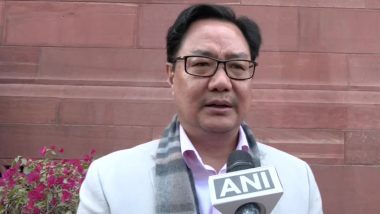New Delhi, February 3: The Law and Justice Minister Kiren Rijiju on Friday informed the Parliament that the Central government is committed to filling up of vacancies expeditiously in a time-bound manner.
He stated that the pendency of cases in courts is not only due to a shortage of judges in High Courts but also due to various other factors like (i) an increase in the number of states and central legislations,(ii) accumulation of first appeals, (iii) continuation of ordinary civil jurisdiction in some of the High Courts, (iv) appeals against orders of quasi-judicial forums going to High Courts, (v) the number of revisions/appeals, (vi) frequent adjournments, (vii) indiscriminate use of writ jurisdiction, (viii) lack of adequate arrangement to monitor, tracking and bunching of cases for hearing, (ix) vacation period of Courts, (x) assigning work of administrative nature to the Judges, etc. Law Minister Kiren Rijiju Says ‘E-Court Helps in Delivering Justice in Virtual Mode During COVID Pandemic’.
He also informed the Parliament that while filling up vacancies in the High Courts is a continuous, integrated and collaborative process that requires consultation and approval from various constitutional authorities, vacancies keep arising on account of retirement, resignation or elevation of Judges. Kiren Rijiju Says ‘Use of Regional Languages in Indian Courts Will Help Common People Get Justice’.
Rijiju further informed, "To increase the judge strength of a High Court, the concurrence of the Chief Justice of the concerned High Court, as well as the State Government, is required since the Chief Justice of that High Court is responsible for the day-to-day administration of the court and the State Government has to provide for infrastructural facilities, salaries of Judges etc. The sanctioned strength of Judges of the High Court has increased from 906 (2014) to 1108 (2022).
(This is an unedited and auto-generated story from Syndicated News feed, LatestLY Staff may not have modified or edited the content body)













 Quickly
Quickly





















